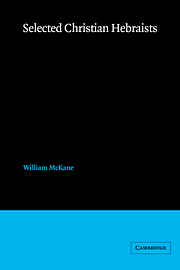Book contents
- Frontmatter
- Contents
- Preface
- List of abbreviations
- Introduction
- 1 The foundations
- 2 Andrew of St Victor
- 3 William Fulke and Gregory Martin
- 4 Richard Simon
- 5 Alexander Geddes
- Conclusion
- APPENDICES
- Notes
- Select bibliography
- General index
- Index of modern authors
- Scripture references
- Index of early Christian Literature
- Frontmatter
- Contents
- Preface
- List of abbreviations
- Introduction
- 1 The foundations
- 2 Andrew of St Victor
- 3 William Fulke and Gregory Martin
- 4 Richard Simon
- 5 Alexander Geddes
- Conclusion
- APPENDICES
- Notes
- Select bibliography
- General index
- Index of modern authors
- Scripture references
- Index of early Christian Literature
Summary
A study of the Hebrew Bible in the Christian Church, conducted through a survey of selected Hebraists, began with Origen and Jerome. The concern of both these scholars to recover the Hebrew Bible may be related to a desire to be better equipped for Christian – Jewish controversy, but it transcends such apologetic considerations. Certainly in Jerome it stems from a conviction that the most original and purest form of the Old Testament is to be found in the Hebrew Bible. Yet there is a continuing reaction in the Church against this Bible, founded on the perception that its Jewishness constitutes a threat to the Christian appreciation of the Old Testament.
Jerome's success in having his Vulgate accepted within Western Christendom, and thereby robbing the Old Latin of its ecclesiastical rank, was a final victory for the Hebrew Bible at the level of translation. However suspect in text-critical respects his concept of Hebraica veritas, however it obscured the history of the Hebrew text and whatever injustice it did to the Septuagint and Old Latin, from then on the Hebrew Bible was established as the original text of the Old Testament. In the context of the Reformation in sixteenth-century England it constituted the first fountain and spring, and so Fulke is in complete agreement with Jerome about the source which has to be translated. The divide between Catholics and Protestants on this subject, as expressed in the conflict between Fulke and Martin, or in the position taken by Simon in the seventeenth century, is caused by different attitudes to the Vulgate.
- Type
- Chapter
- Information
- Selected Christian Hebraists , pp. 191 - 194Publisher: Cambridge University PressPrint publication year: 1989



